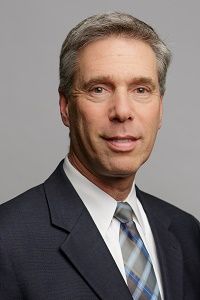Practitioner Relishes Impacting Thousands of Lives Every Day
A dental practice management executive says his time as a clinical dentist gave him the groundwork for his current post overseeing the care of thousands.

Jeff Sulitzer, DMD, took an interesting approach to choosing a career path in college. He knew he wanted to be a healthcare professional. The choice was between becoming a dentist or a doctor.
“It’s something I always wanted to do,” Sulitzer recalls. “Treat patients, kind of be in a world where I can make people’s lives better.”
Sulitzer analyzed his personality, and decided that dentistry would be a better fit than becoming a physician. He liked the idea of being independent, yet still being able to bounce clinical ideas off his colleagues. And, he wouldn’t be dealing with life and death decisions.
“Back in the day when I was in college, I didn’t know if I wanted to make life and death decisions every day,” Sulitzer acknowledges. Today, however, as chief clinical officer at Gentle Dental — InterDent, he feels much more qualified to help people make those decisions. “I can still provide support and make people’s lives better, but I don’t necessarily have to worry about advance directives and whether or not somebody wants to be resuscitated.”
And he has “absolutely no regrets” about his decision.
Leadership Focus
Sulitzer graduated from the Temple University School of Dentistry in 1985 and spent the next 10 years running US Healthcare’s dental division.
“It was a wonderful experience,” he recalls.
He started as a dental director, and over time acquired more business responsibilities. He spent his days in a suit and tie working the administrative side of running dental plans and recruiting dentists for networks. In the evening he would head home, change into scrubs, and treat patients in the private practice he’d started.
“The purpose was to stay a clinical dentist so that I could be more effective in my administrative role with US Healthcare,” he explains.
Over time, however, Sulitzer found that his skillset seemed better directed towards the administrative side of dentistry. He was also happier on that side of the industry.
“If I was in my private practice, I guess I would treat maybe 15 patients a day,” he explains. But in his administrative roles he treats thousands of patients each day, in theory. “And that’s what I enjoy the most. I’ve kind of been able to expand my purview, if you will, or my ability to affect the oral health and general health of patients.”
And because he’s worked as a clinician, Sulitzer believes he can relate to dentists better than others who haven’t been on both sides of the equation.
“It’s very difficult to be a general dentist and deliver excellent oral care to patients day in and day out in the environment in which dentists work,” he says. “There are so many limitations, restrictions, and challenges. And yet they just plug along and get it done. I have the utmost respect for them.”
A Changing Industry
Sulitzer believes that the most important issue facing dentistry today is understanding how oral health affects general health. He says that when people talk about healthcare reform, dentistry is often left out of the conversation. Yet, general dentists or periodontists can create better outcomes for chronic diseases like diabetes or heart disease. When a patient’s periodontal health is improved, their ability to manage other chronic inflammatory diseases improves as well.
“Dentistry needs to make sure that there is a focus and there’s a light that shines on the fact that, as oral healthcare providers, we can actually affect general health as well,” Sulitzer says.
Progress, albeit slow, is being made. Sulitzer says that one of InterDent’s sister organizations is responsible for managing state Medicare programs in Oregon, and has developed a coordinated care organization—coordinating care between physical health, mental health, and oral health.
“I would say within the next 10 years the medical home will become a medical-dental home,” Sulitzer says. “I think it should be. I think it needs to be.”
The dental industry also seems to be following medicine in the way medical practices have been consolidating. That’s a concern to many state dental associations that feel threatened by larger dental service organizations, and wonder why a dentist would want to work anywhere except a private practice.
But, says Sulitzer, that’s not reality today.
“Younger dentists, the dentists who graduate dental school, are graduating with high levels of debt,” he says. “They don’t have the opportunity to go out and go get a loan and buy a dental practice or start a dental practice from scratch. So, they need to associate with either a private practice, or a dental service organization.”
Sulitzer expects that trend to continue.
“Dentists young and old need to understand this phenomenon.”
A Family Man
Despite his children being older, Sulitzer says he is very much a devoted family man. His son, who is 27, is starting medical school, and Sulitzer was active in coaching him through that process. His daughter, who is recently married, has started a career in dentistry.
“We don’t have younger children, but we have two dogs at home, and my wife and I spend a lot of time with them,” he says. “We go on hikes and take advantage of the outdoor environment here in Oregon.”
Looking back, Sulitzer is more than content with his career choice. He’s had the privilege of affecting thousands of patients daily, and takes great pride in helping them gain access to affordable quality care.
“At InterDent, we have over a million patient visits a year,” he says. “I feel that I’ve contributed to those appointments, so, I’m thrilled to say that. I’ve been able to allow people to have access to affordable quality care more than I could have as a general dentist in my own private practice.”